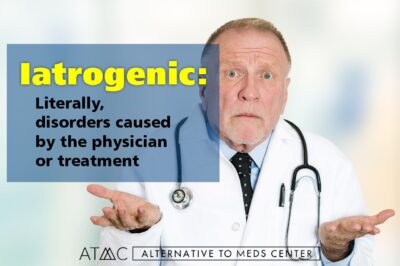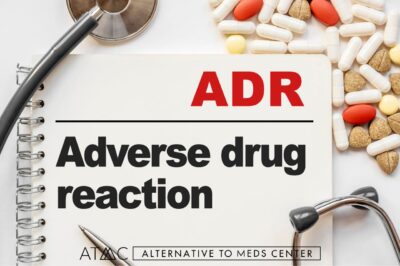Last Updated on June 24, 2025 by
Alternative to Meds Editorial Team
Medically Reviewed by Dr Samuel Lee MD
Table of Contents:
Understanding Iatrogenic Mental Disorders Better
No one talks about iatrogenic disorders nearly enough. Iatrogenic disorders (literally, disorders caused by the physician or treatment) including mental disorders, have not been very well understood. However, in medical literature, it is well known that drugs can cause mental distress, injury, and illnesses.1 Nonetheless, we hear more often about a drug that “triggered some underlying mental illness.” Or, a patient begins a prescription of Klonopin and contracts panic disorder literally overnight. The prescribing physician may not recognize the person’s condition as an iatrogenic or drug-induced disorder. 
Another example is a patient who may opt to take a sleeping pill seeking relief from insomnia. The drug may produce side effects like emotional blunting, depression, and perhaps even suicidality. Promoters of prescription drugs often put a fuzzy filter on the subject of medicine and side effects. Consequently, the practitioner may not recognize these new symptoms as drug side effects, and may even diagnose that a new mental illness has emerged. Through this short-sighted lens, the doctor could even decide that the drug merely “revealed” the underlying condition.2
There is a great burden of information gathering that is placed on prescribing physicians. Simply reading the pamphlets provided by drug sales reps is not going to provide a thorough understanding of all that can be known about drug-based treatments. While the burden of understanding is great, relying solely on advertising-based information commonly places a skewed filter over the judgment of many physicians who otherwise would know better. Medical school curricula on pharmacology also do not relieve this problem adequately. By the time a doctor graduates, probably 1000s of new drugs have come to market, none of which were covered in their studies. And though it may be time-consuming, the prescriber is best-advised to do their own research for as complete an understanding as possible.5,6,12
Iatrogenic Psychiatric Disorders Include:
- Suicidality
- Anxiety, depression, panic attacks, mood disorders
- Insomnia, disturbed sleep
- Lethargy
- Serotonin syndrome
- Agitation
- Confusion
- Hypochondriasis
- Sexual dysfunction
- Invalidism
- Psychosis, hallucinations, mania
- Emotional blunting
- Anhedonia
- Drug dependence
Avoiding Over-Medication
Overmedication is a growing problem in all age groups, not the least of which is the elderly. The more drugs that are prescribed the greater the iatrogenic risk becomes for adverse drug reactions, interactions, and hospitalizations. As a person ages, doctors and practitioners tend to chalk up additional diagnoses of disorders including mental illnesses, and can overlook entirely the identification of cumulative adverse drug reactions, (ADRs). 
A similar but much larger study out of the US showed that 23% of the group of 16,000+ patients were each prescribed a set of 8 potentially inappropriate medications. A large review of prescribing practices that spanned both the US and Europe also found that the practice of inappropriately prescribing medications to elderly care home clients was “highly prevalent,” ranging from 12% to 40% of these populations. Overmedication commonly leads to cognitive impairments, falls, and other drug-related adverse events (ADEs).
The CDC reports that 89% of adults in the US take at least one medication and that 29% take at least 5 medications. The CDC reports also that excess medical treatment for adverse drug events costs about $3.5 billion each year, and that these numbers are growing.
After millions of dollars spent on research, the US Dept of Health’s published guidelines about how to avoid ADEs from overmedication remain sparse. At Alternative to Meds Center, we offer alternatives to medication and safe ways to get off medications that have been inappropriately prescribed. We know these are superior solutions to this problem 3,7-9
Knowledge About Drug Side Effects Is Necessary

Overall, our alternative strategies to medication and safe, gentle tapering programs have consistently transitioned our clients to drug-free or greatly reduced drug reliance, and brought much relief. Iatrogenic mental disorders played a not insignificant part in conditions that debilitated many of our clients for years before finding us and enrolling in a personally tailored treatment program.








